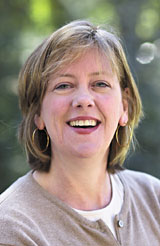![]()
Stanford Report, April 28, 2004
ONE OF THE POSITIVES ABOUT GETTING older may be exactly that: We think more about what's good in life, psychology Professor LAURA CARSTENSEN told a group of prospective freshmen and their parents at an "Academic Expo" presentation during Admit Weekend activities last week. Although research shows a steady and unmistakable drop over time in the speed at which people are able to process and retain new information, as we age we develop a strong memory preference for positive, emotionally meaningful information, she said. Humans uniquely perceive the passage of time and, as we see that we have less time left in life, our goals and behavior change, said Carstensen, who studies emotional and motivational development across adulthood. "Perceived constraints on time motivate people to pursue emotionally meaningful goals and direct cognitive resources to emotional information," she said. "The human mind does not operate like a computer," added Carstensen, whose research includes brain-imaging studies that measure age-related responses to visual images. "Our basic thinking is influenced by what matters to us." Carstensen won a 2003 Guggenheim Fellowship for her work studying the sudden increase in life expectancy in the 20th century and the need for a culture that supports longer life.
THE LESBIAN, GAY, BISEXUAL AND transgender (LGBT) community at Stanford has opened up its scrapbooks to celebrate the 30th anniversary of the establishment of the LGBT Community Resources Center (formerly the Gay People's Union at Stanford) at the Old Firehouse on Santa Teresa Street and Queer Awareness Days (QuAD), which debuted as the first-ever Gay Pride Week in 1974. An exhibit of photographs, clippings and timelines on the second floor of Tresidder Union chronicles the struggles and the achievements of LGBT students at Stanford, from the earliest known individual act of coming out (HARRY HAY, '34, who came out at Branner Hall in 1931) through the relatively recent transformation of a student-run group to a mostly university-funded and staffed center. More information about the LGBT Community Resources Center and QuAD is available at http://lgbt.stanford.edu.
A GOLF CART STOTEN TWO YEARS AGO from Stanford Video was recovered early Monday morning, after police Deputy HARRIS KUHN spotted the cart at 4:30 a.m. parked in a suspicious manner in the Roble lot. The cart had disappeared and been retrieved many times before, including once from the bottom of Lake Lagunita, said CATHERINE O'BRIEN, director of Stanford Video. (The lake was fortunately empty.) O'Brien had finally given up on ever getting the cart back and had just ordered a replacement, "which we can ill afford," when she got the call that the cart had been found. (Kuhn traced the cart back to Stanford Video through its vehicle identification number, which O'Brien had the presence of mind to record, he said.) The thief or thieves had been driving the cart with a chain lock still on, but the cart is running fine and back in (legal) use. Although golf cart theft is epidemic on campus, according to Kuhn, it's no harmless prank. Motor vehicle theft is a felony. And many carts are used by disabled students, faculty and staff to travel around the campus.
Write to Barbara Palmer at barbara.palmer@stanford.edu or mail code 2245 or call her at 724--6184.
![]()

Barbara Palmer
